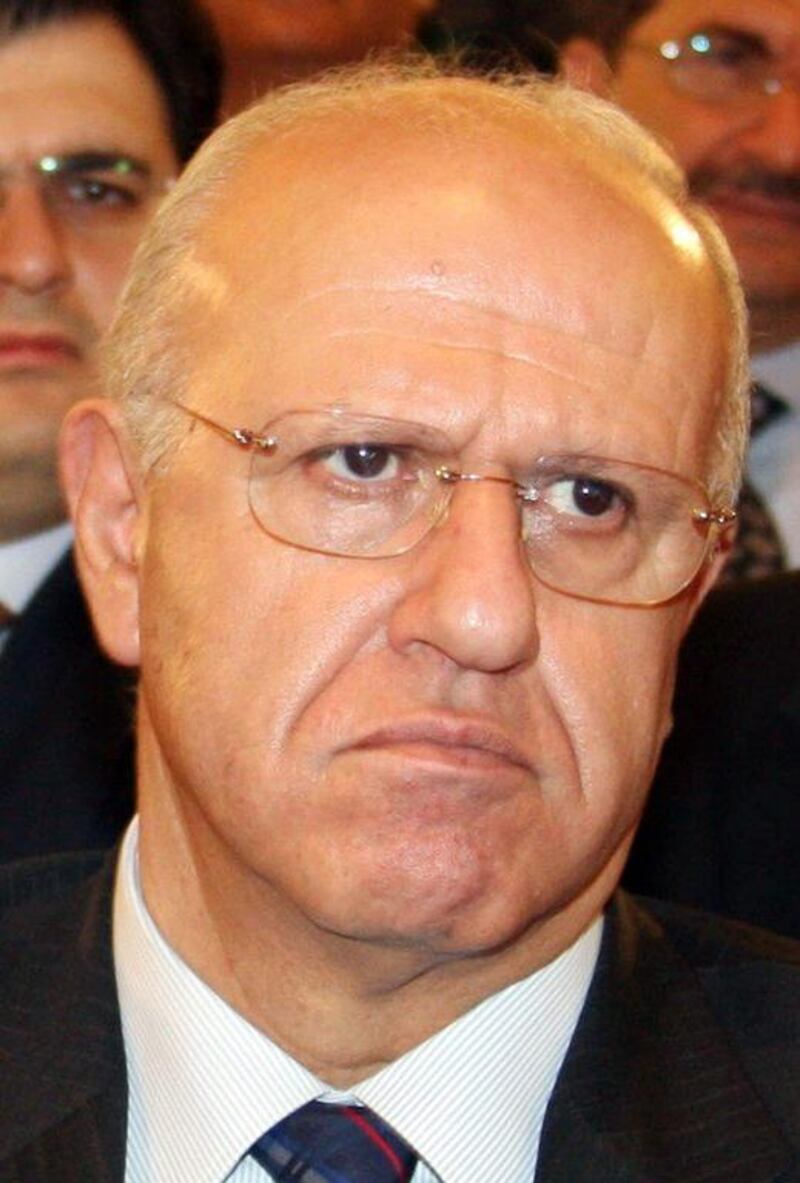BEIRUT// Concerns that the embattled Syrian government continues to hold sway over tiny Lebanon have been rekindled after a former Lebanese minister and friend of Damascus was handed a short jail term for his role in a terrorism plot that threatened to stoke sectarian violence in the already deeply divided country.
The light sentence of former information minister Michel Samaha “legalises murder and terrorism,” the leader of Lebanon’s Progressive Socialist Party and Druze minority community, Walid Joumblatt, told The National on Thursday.
Mr Samaha was sentenced to a prison stint of just four and a half years on Wednesday, with release possible by the end of this year due to time already served.
Last month, the former politician confessed to a military court of his participation in a plan to assassinate religious and political figures in Lebanon, describing how he smuggled explosives into the country. He pleaded guilty to the terrorism charges levelled against him on April 20.
Mr Samaha’s sentencing was met with outrage by many in Lebanon who see it as a failure of justice and evidence of the continued sway of the Syrian regime – which occupied parts of Lebanon from 1976 to 2005 – over the country’s judiciary.
Imad Salamey, a political science professor at Beirut’s Lebanese American University said the sentence represented a “serious national crime”.
“A reduced sentence is really surprising to most Lebanese who expected nothing less than the death penalty for such a crime,” he said.
If the testimony presented to the public is accurate “then the sentence has undermined the judicial system and it makes such crimes legalised”, Mr Salamey added.
Mr Samaha, a Christian, was part of a Syrian regime-backed and funded plot to carry out bombings targeting iftar dinners in Sunni communities in northern Lebanon with the aim of killing politicians and religious figures in 2012.
Many Sunnis in northern Lebanon have enthusiastically supported Syria’s rebels, while Sunni militant groups there have at times taken the fight to Lebanon’s Alawite community, who belong to the same religious sect as president Bashar Al Assad.
A bombing campaign as described in the trial would have almost certainly sparked violence in a number of areas of the country.
Mr Samaha says he coordinated the plot with Maj Gen Ali Mamlouk, a senior security adviser to Mr Al Assad. However, Milad Kfoury, the man who Mr Samaha paid – with Syrian money – to carry out the plot was actually an informant for the Lebanese government. Mr Samaha claims he was entrapped by the government and that Mr Kfoury “poisoned” his mind.
Mr Joumblatt, a former warlord and fierce opponent of the Syrian government, says that the short prison term is the latest evidence of meddling by Syria, and that parts of Lebanon’s government are working on behalf of the Assad regime.
“They [the court] are under the Syrian umbrella,” he said. “We have not been able to extricate our security system, our judicial system, from under the Syrian umbrella. It takes a long time.”
However, with a high level of violence accepted as normal in Lebanon, short sentences are not completely unexpected, said Kamel Wazne, a political analyst and founder of the Centre for American Strategic Studies in Beirut.
“In a country that has equality or that did not have war, it would be a major issue,” he said. “In a country where smuggling weapons is like buying bread or sugar from the grocery, then you say maybe this sentence is fair enough,” he said.
Mr Wazne pointed to the example of the city of Tripoli where Sunni militants have waged conflict with Alawites since the Syrian civil war began. Many militants have been arrested, but many others still roam free, along with those who supplied them with weapons.
It is an open secret that many of Lebanon’s political parties officially deny having militias, while funding armed groups and facilitating the transfer of weapons to them.
And with Lebanon’s different factions deeply involved in the conflict next door – Hizbollah’s forces are defending the Syrian government, while Lebanese Sunni fighters have crossed the border to join the rebels – Mr Salamey also says that violence in the country has become “normalised”.
But despite this, Mr Salamey says that those punished for violence in Lebanon are usually Sunnis.
“There is a growing sense that injustices are being committed in Lebanon against the Sunni community,” he said. “It seems that the law is only being applied toward the Sunni community while other sectarian groups in the country have free reign of committing violence at will without being subjugated to the rule of law.”
Lebanese security forces have cracked down severely on Sunni militants in the country at a time when forces from the Shiite party Hizbollah are openly deployed on Lebanon’s borders and fighting a war in Syria.
Against this background, the perceived failure of Lebanon to properly sentence a man who was planning attacks against Sunnis will likely be viewed as yet another injustice against a community that is already feeling persecuted.
And if left unchecked, Mr Salamey said that this growing feeling of persecution could lead to armed conflict in Lebanon becoming more widespread.
foreign.desk@thenational.ae





